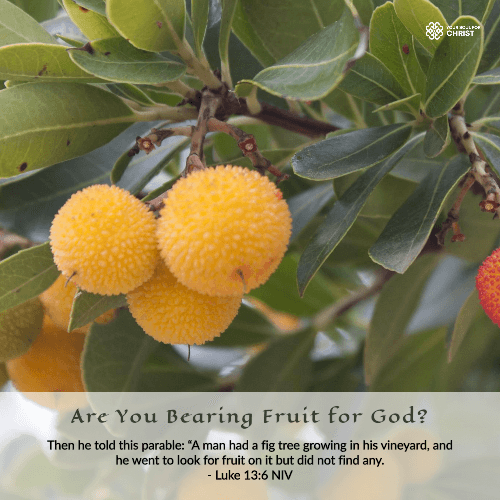Then he told this parable: “A man had a fig tree growing in his vineyard, and he went to look for fruit on it but did not find any.
Luke 13:6 NIV
In the parable from Luke 13:6, Jesus tells of a man who had a fig tree growing in his vineyard. When he went to look for fruit, he found none. This simple yet profound story illustrates a fundamental principle that resonates deeply with both agricultural and spiritual truths: the expectation of fruitfulness. Just as every farmer has the right to expect a harvest from the field he has diligently tended, so does God anticipate spiritual fruit from the lives He nurtures.
Every human, especially a believer, is more to God than the seed is to the farmer. So, if the farmer has an expectation of fruit from the seed he planted and tended, why not God from the life He nurtures? A farmer buys the seed or picks from his previous harvest. However, God created us and brought us to life. More importantly, He saved us from sin and its judgement. Therefore, with all that God has done for us, it is not out of place for HIm to expect fruitfulness. He is just like a farmer looking for fruit from his fig tree in his vineyard.
But the fig tree had nothing to give its owner; not even a single fruit was found. What’s more alarming is that this has been the farmer’s experience for the past three years (v7). Meanwhile, I hope you note that the scripture did not say that the fig tree was planted three years ago. This means that the farmer had given enough time for the fig tree to grow. So, his search for fruit was at the right time the fig was expected to bear fruit.
Likewise, the scripture did not say whether the man had ever found fruit on it. This is to show that previous fruitfulness is not an excuse for the current fruitlessness. Furthermore, the tree may have been bearing fruit. but not for the owner. The tree may bear fruits that either spoil or the birds eat. But as long as the owner did not find any fruit for the past three, it’s still fruitless. The Bible tells us in John 15:16 that God wants us to bear fruits that will remain. In other words, temporary fruitfulness or bearing fruit for others but the Father is not different from fruitlessness.
So, imagine God coming to you looking for fruit, will He find any?
The fig tree’s failure to produce fruit after years of care and patience highlights the gravity of unfulfilled potential. It challenges us to reflect on our own lives and examine whether we are bearing fruit that pleases God. Are we using the gifts, opportunities, and time given to us to produce lasting, meaningful results in our spiritual walk? Are our lives reflecting the transformative power of God’s love?
In conclusion, the parable of the fig tree in Luke 13:6 serves as a poignant reminder of God’s rightful expectation of fruitfulness from our lives. Just as a farmer invests time, effort, and resources into nurturing a fig tree with the hope of a bountiful harvest, God has poured immeasurable love, grace, and salvation into us. He has every right to anticipate spiritual fruit as evidence of our growth and commitment to His will.
Let us not be like the fruitless fig tree, standing idle in the vineyard, but rather, let us strive to bear abundant fruit that remains. This means living out our faith through actions, displaying the fruits of the Spirit, and impacting the world around us positively. When God looks at our lives, may He find an abundance of fruit, glorifying Him and fulfilling our divine purpose.
